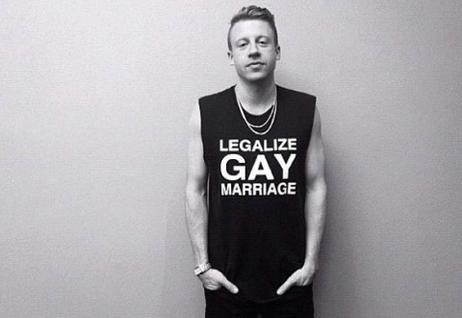A controversy in a Michigan middle school has been resolved, but questions still remain over why a performing arts teacher was severely disciplined after allowing a student to play a marriage equality song in her classroom. The teacher, Susan Johnson, from Centennial Middle School, allowed the song after checking with the student to be sure it fit within the guidelines of the school district. However, the song offended at least one classmate, whose complaint eventually led to the teacherŌĆÖs disciplinary action. Was the teacher merely defending a studentŌĆÖs freedom of speech, or was she in violation of district policy? The answer to that question appears to depend on who you ask.
The video offers an overview of freedom of speech in public schools.
ŌĆ£Same LoveŌĆØ Subject of Controversy
According to , Johnson allowed a student in one of her eighth-grade performing arts classes to play the song ŌĆ£Same LoveŌĆØ by rapper Macklemore during class. Prior to granting permission, Johnson asked the student if the song contained any inappropriate language or references to violence. The student responded that it did not. In fact, ŌĆ£Same LoveŌĆØ is a song about marriage equality, depicting the life of a gay man from beginning to end. Some of the lyrics in the song include:
ŌĆ£CanŌĆÖt change, even if I triedŌĆ”ŌĆØ
ŌĆ£No freedom ŌĆśtil weŌĆÖre equalŌĆ”ŌĆØ
ŌĆ£We become so numb to what weŌĆÖre sayingŌĆ”ŌĆØ
ŌĆ£If I was gay, I would think hip hop hates meŌĆ”ŌĆØ
In addition to the pro-gay message, the song also includes lyrics regarding the church and religion, including:
ŌĆ£If you preach hate at the service those words arenŌĆÖt anointedŌĆ”ŌĆØ
ŌĆ£That holy water that you soak in is poisonedŌĆ”ŌĆØ
Johnson played the song at the request of her student. However, another student in the class was offended by the lyrics and reported the situation to school administrators. The principal and vice-principal then came back to Johnson with the news: she had been suspended for three days for allowing the song in her classroom. Two of those days would be without pay.
The disciplinary procedure, according to , was due to the fact that Johnson did not submit the appropriate form and get permission before playing the song in class. District officials also stated that the song had questionable content regarding sex, religion and politics. The song also contained one sexual slur. The district actually sent out a press release explaining the reasons for JohnsonŌĆÖs suspension, amid the outcry that subsequently ensued.
This video looks at the issue of students' rights to free speech.
JohnsonŌĆÖs Defense
In her defense, Johnson was reported on Michigan Radio as saying, ŌĆ£IŌĆÖm very disappointed in the bias, the bigotry that I feel theyŌĆÖre really hiding behind.ŌĆØ Johnson also told the radio that she never meant to harm any of her students by allowing the song to be played ŌĆō in fact, just the opposite.
ŌĆ£I really love my kids and I never want to hurt them, but I also know thereŌĆÖs a lot of bullying and thereŌĆÖs a lot of gay bashing and racial issues going on in our country and I want the kids to feel comfortable in my class no matter who they are.ŌĆØ
A number of people came to JohnsonŌĆÖs defense after the issue was made public, including Macklemore himself. The rapper spoke to MTV News about the incident, saying he believed the suspension handed down to Johnson was ŌĆ£completely out of line and unjust.ŌĆØ However, Macklemore also said these types of incidents could be used as opportunities as well.
ŌĆ£I think itŌĆÖs important for moments like these to be exposed and for us to pay attention and respond,ŌĆØ Macklemore was reported as saying at MTVŌĆÖs website.
ŌĆ£ItŌĆÖs clear that Ms. Johnson felt that bullying and ŌĆśgay-bashingŌĆÖ were issues that needed to be addressed, and by doing so, was punished,ŌĆØ Macklemore added. He also explained that the song was originally written to promote dialogue about marriage equality that would lead to understanding and empathy.
An op-ed piece in the also supported JohnsonŌĆÖs decision to allow the song to be played in class. The article suggested that Johnson may have been responding to a student who was gay, confused, or simply straight and searching for answers. However, that student may now be labeled as the one that got Johnson suspended if his name ever comes out in the press. The action, according to the publication, may have also set back additional conversations that could have been initiated by students in similar situations at the school.
This video looks at students' first amendment rights in school.
Suspension Overturned
Since the protests over JohnsonŌĆÖs suspension, the school district decided to overturn the disciplinary action. Johnson was able to return to her classroom, and she was paid for all of the days of her suspension.
ŌĆ£I am willing not to uphold the suspension, but the violation of the district practice regarding web-based clips and our expectations for instructions previewing materials under this will remain in writing,ŌĆØ William Pearson, the superintendent for South LyonŌĆÖs Centennial Middle School, where Johnson works, was quoted as saying in the .
Johnson has said that she is happy to return to work, especially to see her students and get all of them back to their routine. However, she explained the suspension and subsequent actions have been stressful. Her sister, Maggie Lourdes, is also an attorney who represented Johnson during the events. Lourdes told CBS Detroit that Johnson has no intention of filing a lawsuit against the school district for the actions against her at this time. However, if the school decides to retaliate against Johnson in any way, Lourdes warned that a lawsuit could be filed in the future.
Questions? Contact us on Facebook. @publicschoolreview














